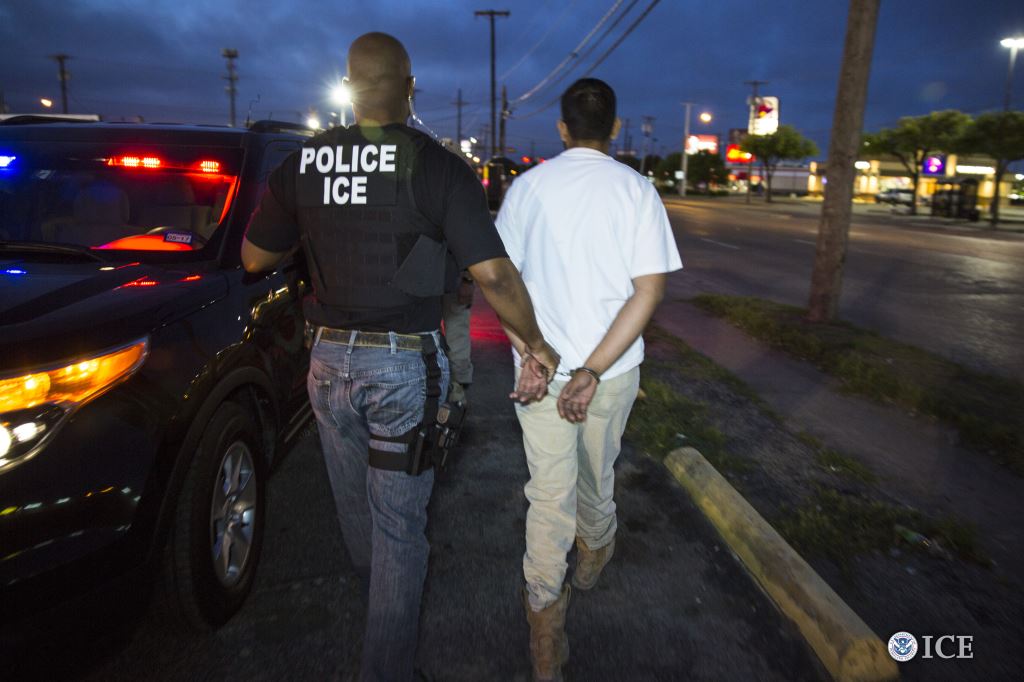The US’s two largest for-profit prison companies, CoreCivic and GEO Group, said in separate earnings calls this week that the companies expect to see significant business from the federal government in the near future due to the Trump administration’s immigration policies.
The companies cited the Immigrations and Customs Enforcement (ICE) agency’s new emphasis on arresting immigrants within the interior of the US rather than at the border as cause for optimism that immigrants will require longer detentions while their cases are adjudicated by immigration judges.
CoreCivic CEO Damon Hininger lamented in the company’s second quarter earnings conference call on Tuesday that arrests along the US-Mexico border have plummeted in 2017 so far. But he noted that immigration arrests across the interior of the US have increased, “albeit to a smaller magnitude than the declines in border apprehensions.”
“Interior enforcement efforts could create demand for additional detention capacity in other areas of the country,” Hininger said. “ICE expects the implementation of new policies and executive orders to lead increases in arrest [sic], charging documents and detainers issued either at the border or in the interior of the country in fiscal year ’18. Second, ICE expects the average length of stay for detainees to increase as a result of increased interior enforcement.”
While immigrants arrested at the border typically are detained for 27 days, those arrested in the interior of the country are detained for roughly 52 days, Hininger added, citing ICE data.
GEO Group's call on Monday took a similar tone, with GEO Group's chief financial officer Brian Evans anticipating a similar increase in detention lengths to roughly 45 days per immigrant.
"In conclusion, we believe we are in a transition period with this new administration, having reduced illegal border crossings and now focusing on interior enforcement," Evans said.
"The new interior enforcement initiative may very well provide additional opportunities due to the need for establishing additional processing centers throughout the country rather than only clustered along the southern border. We are responding to ICE regarding their need to their additional capacity in the North and Northeastern part of the United States."
Longer detention lengths are more lucrative for the companies, as the Department of Homeland Security pays approximately $126 per day for each detainee. As of 2016, 65% of ICE detainees were housed in private, for-profit facilities.
CoreCivic and GEO Group have expressed support for President Donald Trump in the past, with both donating $250,000 to Trump's inauguration. GEO also gave $225,000 to a pro-Trump super PAC during his presidential campaign.
The optimism expressed in the CoreCivic and GEO Group's earnings calls comes even as detention centers run by private prison companies have come under heavy scrutiny in recent years over deaths and allegations of negligence and abusive or inhumane conditions at the facilities.
 Foto: In this Tuesday, Feb. 7, 2017, photo released by U.S. Immigration and Customs Enforcement shows foreign nationals being arrested this week during a targeted enforcement operation conducted by U.S. Immigration and Customs Enforcement (ICE) aimed at immigration fugitives, re-entrants and at-large criminal aliens in Los Angeles. source Immigrations and Customs Enforcement handout via Associated Press
Foto: In this Tuesday, Feb. 7, 2017, photo released by U.S. Immigration and Customs Enforcement shows foreign nationals being arrested this week during a targeted enforcement operation conducted by U.S. Immigration and Customs Enforcement (ICE) aimed at immigration fugitives, re-entrants and at-large criminal aliens in Los Angeles. source Immigrations and Customs Enforcement handout via Associated Press
Slower deportations, longer detentions
As the executives in the CoreCivic and GEO Group calls noted, the Trump administration has made a major pivot in its deportation strategy, focusing on so-called "interior arrests" as arrests at the border have decreased.
It's a significant shift, as border arrests can be processed much more quickly and result in speedier deportations. Immigrants who are caught up in interior arrests, meanwhile, typically spend longer periods of time in detention as many of them have resided in the US for years and laid down extensive employment or family ties that can boost their claims to residency and complicate efforts to deport them.
ICE director Thomas Homan said as much to reporters in May when he explained that deportations had declined at that point by 12% under the Trump administration. Former Homeland Security Secretary John Kelly, who is now the White House chief of staff, also confirmed in written congressional testimony in May that interior arrests were a priority for the Trump administration.
"Effective border security must be augmented by vigorous interior enforcement," Kelly said, adding that the DHS' budget request for fiscal year 2018 included funding for 51,000 additional detention beds that would be needed to accommodate the increased interior arrests.
The Trump administration so far has been deporting people at a slower pace than even the slowest years of the Obama administration, removing roughly 16,900 people per month so far in 2017 compared to the 20,000 deported per month in fiscal year 2016, according to a recent Politico analysis of ICE data.
Deportations under President Barack Obama reached a peak in fiscal year 2012, which saw the deportations of about 34,000 people per month.
The Trump administration's increased arrest rate combined with the decreased deportation rate has effectively bottle-necked the immigration detention system, in which detainees are now anticipated to be confined for longer periods as their cases wind through the court system.
The Justice Department said on Tuesday it has hired 54 immigration judges since Trump took office, and will continue to hire more to clear the backlog.

